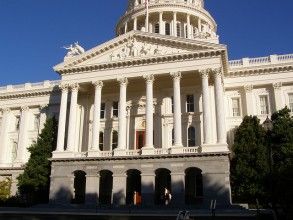Legislators, governor to get 4 percent raise
 A state panel approved a 4 percent increase in pay for legislators and statewide elected officers on Wednesday.
A state panel approved a 4 percent increase in pay for legislators and statewide elected officers on Wednesday.
The average legislator’s salary will rise to $104,118 annually, although several have refused any increases. Gov. Jerry Brown’s salary will increase to $190,103 annually.
The other officers receiving increases are: Lieutenant governor, attorney general, controller, treasurer, secretary of state, superintendent of public instruction, insurance commissioner and the members of the Board of Equalization.
The increase will go into effect Dec. 7.
About the CCCC
Pay is determined by a seven-member panel of citizens representing different sections of the community. In fact, one of the positions, which is required to be filled by a representative of the “general population,” is actually filled by a wealthy, well-connected developer from Stockton.
Brown — who is tasked with appointing members of the California Citizens Compensation Commission — has not filled three vacancies in at least a year, which exceeds the 15-day window mandated by the state’s Constitution.
The CCCC had to cancel its May meeting due to lack of quorum.
Pay Scale History
California has the highest paid state legislators in the country, according to the National Conference of State Legislators. They are also paid well above the state’s median income of around $61,084.
On the whole, base salary for legislators has increased since 2005. To be more precise, legislators have received six increases, three freezes and two reductions since 2005. To be even more precise, base salary went from $99,000 in 2005 to the $100,113 base salary it is today — after salaries had been frozen between 1999 to 2005.
The two reductions were largely orchestrated by the former chairman Charles Murray, a holdover appointee from the Schwarzenegger administration. Murray stepped down almost a year ago to the day.
The six increases: 2005 – 12 percent increase; 2006 – 2 percent increase; 2007 – 2.75 percent increase; 2013 – 5 percent increase; 2014 – 2 percent increase; 2015 – 3 percent increase.
The two decreases: 2009 – 18 percent reduction; 2012 – 5 percent reduction.
And the three freezes were in 2008, 2010 and 2011.
As readers can probably imagine, the decreases were unpopular in Sacramento. In fact, one former legislator fought a cut — the 18 percent reduction in 2009 that slashed salaries from $116,208 to $95,291 — by appealing to both Brown and the California Victim Compensation and Government Claims Board.
Neither appeal was successful.
Related Articles
Middle class squeezed in Bay Area
Driven by shifting economics, demographics, and changing definitions of moderate prosperity, middle class Californians in areas once rife with new arrivals
CA loosens sex offender restrictions
California’s strict limits on housing for sex offenders have been effectively wiped out, thanks to the consequences of a shift
Farm workers fight UFW unionization
The United Farm Workers labor union and the state Agricultural Labor Relations Board have found themselves on the brink of ruination




